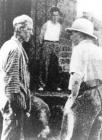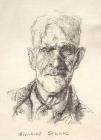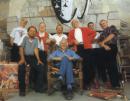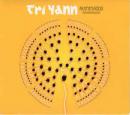Grande nouvelle en Bretagne :
Seznec est arrivé tantôt,
De plus de vingt ans de bagne,
Il nous revient en héros.
Grande nouvelle en Bretagne,
De Nantes jusqu'à Landerneau.
D'avoir fleuri Marie-Jeanne
En terre depuis seize ans,
D'embrasser sa fille Jeanne
Qui s'est battue tant et tant,
De serrer d'embrasser Jeanne
Qui pour lui s'est battue tant.
Grande foule hier au Havre,
Mardi premier de juillet :
Le Colombie, blanche étrave,
Mille et plus le guettaient,
Blanc Colombie, blanche étrave,
Mille et plus l'acclamaient.
Vingt trois années d'absence
N'ont point tué son entêtement,
A redire son innocence,
Malgré ses cheveux blancs,
A crier son innocence
A soixante-dix ans.
C'est devoir pour la Justice
Toujours de mériter son nom;
Après Guillaume, son petit-fils
Lui en réclame raison.
A Guillaume rendons justice,
Il n'est que trop de raisons.
Qu'elle veuille belle se faire,
Une ceinture lui offrirons,
Pour faire le tour de la terre
Et trois tours de sa maison,
Faire trois tours de la terre
Et trois tours de l'horizon,
Une ceinture de cire
Fragile comme jugements,
Punir l'innocence est pire
Qu'acquitter les brigands;
Punir l'innocence est pire,
Pire des jugements.
Seznec est arrivé tantôt,
De plus de vingt ans de bagne,
Il nous revient en héros.
Grande nouvelle en Bretagne,
De Nantes jusqu'à Landerneau.
D'avoir fleuri Marie-Jeanne
En terre depuis seize ans,
D'embrasser sa fille Jeanne
Qui s'est battue tant et tant,
De serrer d'embrasser Jeanne
Qui pour lui s'est battue tant.
Grande foule hier au Havre,
Mardi premier de juillet :
Le Colombie, blanche étrave,
Mille et plus le guettaient,
Blanc Colombie, blanche étrave,
Mille et plus l'acclamaient.
Vingt trois années d'absence
N'ont point tué son entêtement,
A redire son innocence,
Malgré ses cheveux blancs,
A crier son innocence
A soixante-dix ans.
C'est devoir pour la Justice
Toujours de mériter son nom;
Après Guillaume, son petit-fils
Lui en réclame raison.
A Guillaume rendons justice,
Il n'est que trop de raisons.
Qu'elle veuille belle se faire,
Une ceinture lui offrirons,
Pour faire le tour de la terre
Et trois tours de sa maison,
Faire trois tours de la terre
Et trois tours de l'horizon,
Une ceinture de cire
Fragile comme jugements,
Punir l'innocence est pire
Qu'acquitter les brigands;
Punir l'innocence est pire,
Pire des jugements.
inviata da Riccardo Venturi - 4/12/2005 - 01:44
Lingua: Italiano
Versione italiana di Riccardo Venturi
eseguita il 13 aprile 2005
dalla mailing list "Triyannetc"
eseguita il 13 aprile 2005
dalla mailing list "Triyannetc"
LA LIBERAZIONE
Grande notizia in Bretagna :
Seznec è appena arrivato
da più di vent’anni di bagno,
e ritorna a noi da eroe.
Grande notizia in Bretagna,
da Nantes a Landerneau.
Ha portato dei fiori a Marie-Jeanne,
sotto terra da sedici anni,
ha abbracciato sua figlia Jeanne
che si è battuta talmente tanto,
ha abbracciato, ha stretto Jeanne
che per lui s’è battuta tanto.
Grande folla ieri a Le Havre,
martedì primo luglio :
Il « Colombie » dalla bianca prora,
mille e più lo fissavano,
Il bianco « Colombie » dalla bianca prora,
mille e più l’acclamavano.
Ventitré anni di assenza
non hanno scalfito la sua ostinazione
di ripetere la sua innocenza
nonostante i capelli bianchi,
di gridare la sua innocenza
a settant’anni.
E’ un dovere per la Giustizia
meritare sempre il suo nome ;
dopo Guillaume, suo nipote
ne reclama soddisfazione.
A Guillaume sia resa giustizia
per anche troppe ragioni.
E si voglia fare bella,
le offriremo una cintura
per fare il giro del mondo
e tre giri della sua casa,
per fare tre giri del mondo
e tre giri dell’orizzonte.
Una cintura di cera [*]
fragile come i giudizi,
punire l’innocenza è peggio
che assolvere i delinquenti,
punire l’innocenza è il peggiore,
il peggiore dei giudizi.
Grande notizia in Bretagna :
Seznec è appena arrivato
da più di vent’anni di bagno,
e ritorna a noi da eroe.
Grande notizia in Bretagna,
da Nantes a Landerneau.
Ha portato dei fiori a Marie-Jeanne,
sotto terra da sedici anni,
ha abbracciato sua figlia Jeanne
che si è battuta talmente tanto,
ha abbracciato, ha stretto Jeanne
che per lui s’è battuta tanto.
Grande folla ieri a Le Havre,
martedì primo luglio :
Il « Colombie » dalla bianca prora,
mille e più lo fissavano,
Il bianco « Colombie » dalla bianca prora,
mille e più l’acclamavano.
Ventitré anni di assenza
non hanno scalfito la sua ostinazione
di ripetere la sua innocenza
nonostante i capelli bianchi,
di gridare la sua innocenza
a settant’anni.
E’ un dovere per la Giustizia
meritare sempre il suo nome ;
dopo Guillaume, suo nipote
ne reclama soddisfazione.
A Guillaume sia resa giustizia
per anche troppe ragioni.
E si voglia fare bella,
le offriremo una cintura
per fare il giro del mondo
e tre giri della sua casa,
per fare tre giri del mondo
e tre giri dell’orizzonte.
Una cintura di cera [*]
fragile come i giudizi,
punire l’innocenza è peggio
che assolvere i delinquenti,
punire l’innocenza è il peggiore,
il peggiore dei giudizi.
Nota alla traduzione:
[*] Il topos della "cintura di cera" che avvolge tre volte una persona, una casa o la terra stessa si ritrova spesso nei canti e nei racconti popolari bretoni, ad esempio nel "Barzaz Breizh" ("La peste d'Elliant", "Lez-Breiz"...). Rappresenta probabilmente una credenza antichissima, precristiana: una supplica magica piena di devozione per far sì che le divinità esaudiscano le preghiere.
L'aver fatto riferimento a questa credenza, è segno inconfutabile che l'anonimo autore della canzone voleva rifarsi alla Bretagna secolare per onorare un bretone considerato un eroe nella sua sofferenza causata dall'ingiustizia.
[*] Il topos della "cintura di cera" che avvolge tre volte una persona, una casa o la terra stessa si ritrova spesso nei canti e nei racconti popolari bretoni, ad esempio nel "Barzaz Breizh" ("La peste d'Elliant", "Lez-Breiz"...). Rappresenta probabilmente una credenza antichissima, precristiana: una supplica magica piena di devozione per far sì che le divinità esaudiscano le preghiere.
L'aver fatto riferimento a questa credenza, è segno inconfutabile che l'anonimo autore della canzone voleva rifarsi alla Bretagna secolare per onorare un bretone considerato un eroe nella sua sofferenza causata dall'ingiustizia.
Lingua: Inglese
English Version by Riccardo Venturi
January 9, 2006
January 9, 2006
THE RELEASE
Great news to Brittany :
Seznec has just landed there,
after over twenty years’ conviction
he comes back as a hero.
Great news to Brittany,
from Nantes to Landerneau.
He’s brought flowers to Marie-Jeanne
dead and buried since sixteen years,
he’s kiss’d and hugged his daughter Jeanne
who fought for him so much,
kiss’d and hugged Jeanne in his arms,
she fought for him so much.
Great crowd yesterday in Le Havre,
on Tuesday the first of July :
thousands cast their moved glances
at the white-prowed « Colombie »,
thousands cast their cries of hurra
at the white-prowed « Colombie ».
After twenty three years’ absence
he’s obstinated like he was before
in proclaiming his innocence
though his hair is white now,
in crying loud his innocence
though aged seventy.
It is a duty for Justice
to be always this name worth ;
after Guillaume, it’s his grandson
who claims for satisfaction.
So be justice done to Guillaume
for even too many reasons.
So may Justice be adorn’d,
and we’ll offer Her a girdle
to make the tour of the world
and three tours of his house,
to make three tours of the world
and three tours of the horizon.
We’ll offer Her a wax girdle [*]
fragile as judgements,
an innocent’s punishment is worse
than releasing a criminal,
an innocent’s punishment
is the worst judgement of all.
Great news to Brittany :
Seznec has just landed there,
after over twenty years’ conviction
he comes back as a hero.
Great news to Brittany,
from Nantes to Landerneau.
He’s brought flowers to Marie-Jeanne
dead and buried since sixteen years,
he’s kiss’d and hugged his daughter Jeanne
who fought for him so much,
kiss’d and hugged Jeanne in his arms,
she fought for him so much.
Great crowd yesterday in Le Havre,
on Tuesday the first of July :
thousands cast their moved glances
at the white-prowed « Colombie »,
thousands cast their cries of hurra
at the white-prowed « Colombie ».
After twenty three years’ absence
he’s obstinated like he was before
in proclaiming his innocence
though his hair is white now,
in crying loud his innocence
though aged seventy.
It is a duty for Justice
to be always this name worth ;
after Guillaume, it’s his grandson
who claims for satisfaction.
So be justice done to Guillaume
for even too many reasons.
So may Justice be adorn’d,
and we’ll offer Her a girdle
to make the tour of the world
and three tours of his house,
to make three tours of the world
and three tours of the horizon.
We’ll offer Her a wax girdle [*]
fragile as judgements,
an innocent’s punishment is worse
than releasing a criminal,
an innocent’s punishment
is the worst judgement of all.
Translation note :
[*] The topos of the « Wax girdle » winding three turns around a person, a house or the Earth is often to be found in Breton folksongs and folktales, f.ex. in the « Barzaz Breizh » (« Elliant’s Pestilence », « Lez-Breiz » etc.). It is probably the echo of a very old, pre-Christian belief, a magic and pious supplication to the gods for hearing and answering one’s prayers.
Reference to this belief shows clearly that the anonymous ballad maker intended to appeal century-old Brittany to honour a Breton who was considered a hero for his sufferings caused by injustice.
[*] The topos of the « Wax girdle » winding three turns around a person, a house or the Earth is often to be found in Breton folksongs and folktales, f.ex. in the « Barzaz Breizh » (« Elliant’s Pestilence », « Lez-Breiz » etc.). It is probably the echo of a very old, pre-Christian belief, a magic and pious supplication to the gods for hearing and answering one’s prayers.
Reference to this belief shows clearly that the anonymous ballad maker intended to appeal century-old Brittany to honour a Breton who was considered a hero for his sufferings caused by injustice.
cari, fratelli italiani
Seznec non e nato ne anche morta a morlaix, ma a plomodiern
perso.orange.fr@guillaume.seznec
bacci
Seznec non e nato ne anche morta a morlaix, ma a plomodiern
perso.orange.fr@guillaume.seznec
bacci
Cher frère, merci pour ton intervention. Nous savons bien que Guillaume Seznec était né à Plomodiern -et nous l'avons specifié très clairement dans sa biographie! [RV]
Gilles - 18/7/2006 - 20:52
×
![]()









Dall’album « Portraits »
From the album "Portraits"
Canzone popolare bretone
Arrangiamento : Tri Yann 4 (1995)
Breton folksong arranged by Tri Yann 4 (1995)
Le canzoni su Guillaume Seznec:
The Song Cycle on Guillaume Seznec:
1. Introduction/Introduzione
2. Le Voyage/Il Viaggio/The Journey
3. Le Procès de Guillaume Seznec/Il Processo di Guillaume Seznec/Guillaume Seznec's Trial
4. L'Adieu/L'Addio/The Adieu
5. Le Bagne/Il Bagno/The Penal Colony
6. La Délivrance/La Liberazione/The Release
7. Seznec est Innocent!/Seznec è innocente!/Seznec is not Guilty!\
A Le Havre, Seznec sbarca in segreto da un’uscita secondaria per sfuggire alla calca. Il ricongiungimento coi suoi due figli superstiti e coi suoi nipoti, che non ha mai visto, è comprensibilmente emozionante.
Tornato a Morlaix, la prima cosa che fa è andare a raccogliersi sulla tomba della moglie Marie-Jeanne, morta nel 1931. Va a vivere con la figlia maggiore, Jeanne, che nel frattempo si è sposata ed ha avuto dei figli. Non cessa mai di proclamare la sua innocenza nelle conferenze e nelle interviste.
La sera del 14 novembre 1953 Guillaume Seznec si trova a Parigi, proprio per una conferenza. In pieno centro, viene investito da un furgone il cui conducente si dà alla fuga. Riporta ferite gravissime. Incidente o tentativo di omicidio ? Un testimone oculare afferma con precisione che Seznec, diventato oramai un personaggio assai scomodo, sarebbe stato spinto sotto le ruote dell’autoveicolo.
Il 13 febbraio 1954, all’età di 76 anni, Guillaume Seznec muore in seguito alle ferite riportate nell’ «incidente». Un terzo della sua vita la ha passata prigioniero di una giustizia ingiusta e di un sistema di potere assassino. Era nato il 1° maggio 1878 a Plomodiern, nel Finistère, da una famiglia contadina. Il suo cognome è la resa francesizzata del bretone «saoznek», che, curiosamente, significa «Inglese».
Due giorni dopo la sua morte, Boris Vian compone Le déserteur.
La canzone è ancora una volta nata dalla gente di Bretagna, che aveva seguito con passione e partecipazione le vicende di Guillaume Seznec. I Tri Yann ne hanno fornito un arrangiamento assolutamente splendido, sicuramente una delle vette della loro arte (consigliamo a tale riguardo caldamente di approfittare della possibilità di scaricarla liberamente, e di ascoltarla).
La traduzione italiana che accompagna la canzone è stata da me eseguita il 13 aprile 2005, due giorni dopo la storica sentenza che ha ordinato la revisione del processo a Guillaume Seznec. Inviata sulla mailing list dei Tri Yann, è stata dallo owner, e press-agent dei Tri Yann, Eric Doll, inviata e fatta leggere ai Tri Yann stessi, e a Denis Seznec. (RV)
Great emotion rises in Brittany. Guillaume Seznec, who has become the symbol of all injustices endured by Bretons, embarks as a free man on the steamer «Le Colombie » bound for Le Havre, where he lands on July 1, 1947. All his family is waiting for him, together with an immense crowd and the whole French press. A most celebrated picture of Seznec is taken on board of « Le Colombie », the same picture appearing on Tri Yann’s « Portraits » album cover. Seznec is 69 years old, but he looks at least 85 ; only his eyes, still very bright, cast a vivid glance of hope, of eagerness for justice, of rage. Quite rightly, the picture of Seznec on board of « Le Colombie » was judged one of the most beautiful photographs of the 20th century.
Once landed in Le Havre, Seznec gets off covertly by a side exit to avoid being suffocated by the crowd. Reunion with his two surviving children and with his grandchildren, whom he has never seen, is touching.
Seznec comes back to Morlaix, and the first thing he does is going to weep and pray on his wife Marie Jeanne’s grave, died 1931. He settles down in his eldest daughter’s house, Jeanne, who has got married in the meantime and has got her own children. He never ceases proclaiming his innocence on interviews and speeches.
In the late evening of November 14, 1953, Guillaume Seznec is in Paris to deliver a speech on his case. Right downtown, he is run over by a van while the driver takes flight, and is most seriously injured. Was it an accident or an attempted murder ? An eyewitness says with great precision that Seznec, now become a troublesome personage, had been deliberately pushed by someone under the van’s wheels…
On February 13, 1954, Guillaume Seznec, aged 76, dies in consequence of the injuries received in the « accident ». He spent one third of his life as a prisoner of unjust justice and of a murderous power system. He was born on May 1, 1878 in Plomodiern, in the departement of Finistère, into a family of small farmers. His family name is the gallicized spelling of Breton « saoznek », what, rather curiously, means « Englishman ».
Two days after his death, Boris Vian writes Le déserteur.
Once more, a folksong arisen in the Breton people who had participated with passion in Guillaume Seznec’s hardships. Tri Yann’s splendid arrangement stands out at the top of their musical creativeness (in this regard, we warmly recommend you to avail yourself of the opportunity of free download, and to listen to the song).
I made the Italian translation attached to the song on April 13, 2005, two days after the historic sentence ordering retrial of Guillaume Seznec’s case. I sent it to Tri Yann mailing list, and the list owner and Tri Yann’s press agent, Eric Doll, made it available to Tri Yann themselves and to Denis Seznec. (RV)